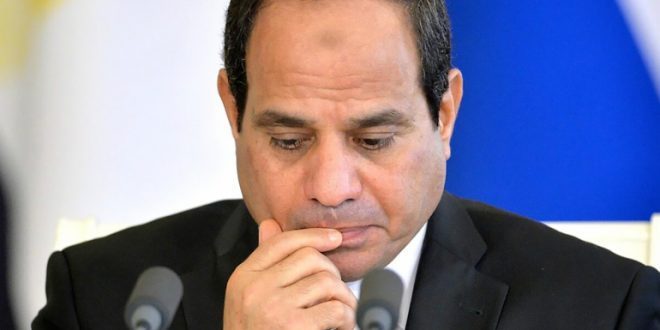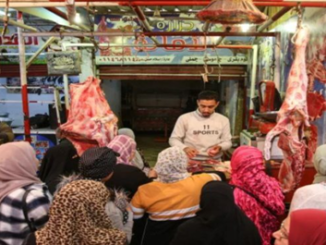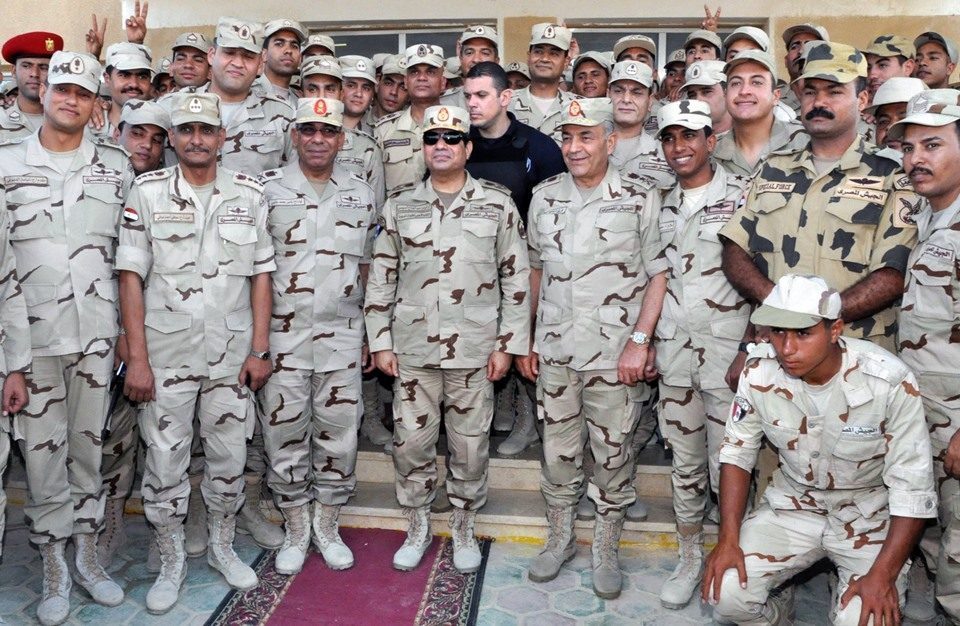
The global crises, including the Covid-19 pandemic and the Russian war on Ukraine have magnified the fragility of the country’s state-driven economic model and forced it to take out new multilateral loans
“When Egypt was forced to go cap-in-hand to the IMF as it struggled with a foreign currency crisis and dwindling reserves in 2016, Abdel Fattah al-Sisi was adamant that he would take the “hard decisions” that his predecessors avoided in order to turn round the ailing economy,” says Andrew England in a recent piece on the Financial Times.
England says Sisi insisted that Egypt had to bridge the gap between resources and spending, although he would have to push through politically sensitive reforms that would heap pain on millions of impoverished Egyptians – to be able to secure a $12bn loan from the IMF.
“We borrow and we borrow, and the more we borrow the more the debt grows. All the hard decisions that many over the years were scared to take: I will not hesitate for a second to take them,” England quotes Sisi as saying.
But the writer wonders that “Six years on, Egypt is once again depending on IMF support as it grapples with another foreign currency shortage, with the fund agreeing last week to a new $3bn loan package. It is the fourth time Cairo has sought the fund’s help since Sisi seized power in a coup in 2013, with Egypt holding the unwanted mantle of being the second biggest debtor to the IMF after Argentina. In total, it owes multilateral institutions $52bn.”
Andrew England also quotes Sisi as saying that “Even the brothers and friends, they are now convinced that the Egyptian state is unable to stand up again and that years of support and help has led to the creation of a culture of dependency on them to resolve crises and problems,” he said. The writer then proceeds on his valuable piece as follows:
In part, Egypt’s woes have underscored the vulnerabilities of poorer nations to the repercussions of Russia’s war in Ukraine after it triggered capital flight from emerging markets and caused food and energy prices to soar — raising import costs just as a vital source of foreign currency dried up. But economists and Egyptian businessmen say that there are more fundamental issues at stake, arguing that the global crisis has magnified the fragility of Sisi’s state-driven economic model.
Under Sisi’s watch, Cairo became increasingly dependent on hot money flowing into domestic debt to finance its current account deficit as the central bank propped up the pound and kept interest rates in the double digits. One result is that Cairo had until recently been paying the world’s highest real interest rates on its debt.
At the same time, Sisi relied on the military to drive growth as it was put in charge of scores of infrastructure projects and encouraged to spread its economic footprint across myriad sectors, from pasta to cement and beverages, crowding out the private sector and dissuading foreign direct investment. The complaint is that the hot money was used to support massive state spending, much of it through the military, that soaked up the foreign currency.
Now, the question Egyptian businessmen and analysts are asking is whether the shock of the past six months will be sufficient to force Sisi to take arguably his toughest economic decision: rolling back the army’s role in the economy. That, economists say, will be crucial if the private sector is to flourish and for the country to attract greater levels of FDI to bring in more sustainable sources of foreign currency.
“We need to stop the bleeding,” says a business owner, who, like many others, wants to remain anonymous given fear of repercussions in an autocratic state. “If we carry on this way it’s to the Paris Club [for debt relief], haircuts, selling assets and in a state of bankruptcy.”
Some businessmen cautiously hope that the rattled government has finally woken up to the precarious path the economy was heading.
“It [the crisis] could be a blessing in disguise,” says another executive. “There seems to be a consensus and an understanding that things have to change because there’s no other solutions.”
Others remain wary. If Sisi is to reduce the military’s footprint, the former army chief will be taking on his core constituency and the nation’s most powerful institution with all its associated vested interests.
“It will be very difficult,” says the business owner. “You give your kid a toy and how do you take it away? It will take a lot of courage to take back from the army and I worry about this. If you think privatization in the public sector is difficult, what about a military factory?”
Jason Tuvey at Capital Economics says “the military is not going to give up its interests very quickly, and we have to bear in mind the military is very close to Sisi, it could put pressure on him if it feels its interests are coming under pressure.”
Michael Wahid Hanna, an analyst at Crisis Group, says that reducing the role of the military “would require a rewiring and reordering of large parts of the economy.” He adds: “And that’s hard.”
The ‘crisis committee’
Egypt’s leaders were jolted into action almost as soon as Russians invaded Ukraine in late February as they braced for the global repercussions of the conflict. The regime swiftly established a “crisis committee” to meet weekly and focused on ensuring food security for its 100mn population, tens of millions of whom rely on subsidized bread.
The army was ordered to supply millions of heavily discounted “food boxes” to vulnerable families, while officials sought to diversify sources of imports for the world’s top wheat importer. Before Russian president Vladimir Putin launched his offensive, Egypt depended on Russia and Ukraine for about 80 per cent of its imported wheat, and the fear was that it would be one of the countries most exposed to supply shortages and increases in food prices.
“I worry about Egypt,” Kristalina Georgieva, managing director of the IMF, said in March.
But it was not food security that would prove to be the state’s Achilles heel. Instead, it was wary foreign fund managers pulling about $20bn out of Egyptian debt in February and March, triggering the foreign currency crisis.
Sisi, who brooks zero dissent, was shocked to discover the weaknesses in the system, people briefed on government discussions said.
On March 8, he jumped on a plane to Saudi Arabia, one of Cairo’s traditional backers, and by the end of the month Riyadh had deposited $5bn in Egypt’s central bank. It was part of a wider Gulf bailout, with the United Arab Emirates depositing $5bn and Qatar $3bn.
“I dread to think,” says an Egyptian banker, when asked what would have happened if the Gulf states had not ridden to Cairo’s rescue. “Sisi was very unhappy and it took him by surprise — the degree of fragility in the financial system.”
The three Gulf states also committed to investing billions of dollars to acquire state holdings in Egyptian companies through their sovereign wealth funds. Saudi Arabia’s Public Investment Fund and Abu Dhabi’s ADQ fund have already spent about $4bn this year acquiring stakes in companies, including a bank, and chemicals, fertilizer, logistics and tech firms.
It was also in March that Cairo turned to the IMF for support, finally sealing the $3bn loan last week. In addition, Egypt will receive another $5bn from multilateral and regional donors — likely to be the Gulf states again — this financial year, the fund said.
Even officials are acknowledging that the crisis was a wake-up call.
A state official says that it was always the government’s goal to “unlock FDI”. But “maybe people got a bit relaxed and didn’t put the plan to work properly.”
“Did we learn from the lesson? Yes . . . the guys at the central bank understand it’s not easy money,” says an Egyptian banker. “My feeling is, at the top, people understand we have a challenge, that challenge is we overspent in a short period of time.”
But the critical test will be whether the regime seriously addresses the overbearing dominance of the state in the economy, particularly the military’s role.
“The fundamental problem is Egypt has been living beyond its means. It produces and sells to the rest of the world significantly less than it imports, which it finances through debt,” says an Egyptian economist. “A lot of the state consumption comes outside the budget in the form of military investment. If you look at a lot of these megaprojects it’s the military financing it . . . they are adding to the import bill and creating a net outflow of dollars.”
Rhetorically, at least, the leadership has signaled it is ready to act.
Speaking to businessmen and government officials at an economic conference held earlier this month in response to the crisis, Sisi gave mixed signals, defending his record while also suggesting he was willing to reduce the state’s role.
“I solved the problem of the ports and of the infrastructure of the state in a different way. The route that you suggested offering [projects] to the private sector and offering it to the foreigners, I’m with you, but I didn’t have the time for more delays,” the president said. “Are state companies on offer [for sale]? Yes . . . . By God, by God, by God all the companies of the armed forces are with you [available for sale].”
Two months earlier, Sisi had accepted the resignation of central bank governor Tarek Amer, who many criticized for his role in the malaise.
“The governor was very close to the army and was satisfying all the military’s needs with no strings attached,” says the Egyptian executive.
The central bank has since said it would allow a flexible exchange regime, something the fund was demanding. The loan package was intended to help Egypt “push forward deep structural and governance reforms to promote private sector-led growth and job creation,” the IMF said.
As far back as April, Sisi had announced that the government would raise $40bn over four years through the sale of state assets and said it would start selling stakes of military companies on the stock exchange “before the end of year”. In the same speech, he also called for “political dialogue” with youth movements and political parties, a surprise move for a president who presides over a regime that has jailed tens of thousands of people and is accused of being Egypt’s most oppressive in decades.
Hanna, the Crisis Group analyst, says while the dialogue is limited in nature, the regime is “doing some things we didn’t think possible not so long ago”.
“There’s a lot of skepticism and frustration with it, and concerns that it’s a PR exercise,” Hanna says. “But it’s reflective of the fact there’s pressure; they recognize this moment is different and they need to respond differently.”
The government is also working on a “state-ownership” document intended to outline sectors in which it envisages a role for state entities, including the military, and where their presence should be reduced or completely withdrawn.
In drawing up its plans, the government has engaged with the IMF, the World Bank and businessmen as it targets more than doubling the private sector’s role in the economy to 65 per cent over the next three years. But months after the initiative was first announced, the final document has not been published. Sisi has previously made pledges to sell-off stakes in military companies over the past three years, but the rhetoric has yet to be matched by asset sales on the ground.
“It’s a hard thing to unwind; it would be in a sense a major ideological reversal,” Hanna says. “During the Sisi era, military privilege has increased; their role in the economy has increased and that has created real winners, including within the military and former military. It is its own kind of patronage.”
Leaning on the military
Sisi has relied on the military as the prime vehicle to drive his economic plans since he inherited a broken economy after ousting Islamist leader Mohamed Morsi, the country’s first democratically elected president, nine years ago.
His government earned plaudits from the IMF, businessmen and bankers in 2016 after pushing through tough reforms, including slashing energy subsidies and trimming the state’s wage bill, to secure that year’s $12bn loan and bring fiscal stability. It also allowed the pound to devalue, with the currency losing half its value that year.
However, the regime did little to improve the investment climate in a country long blighted by an unwieldy bureaucracy, poor logistics and corruption, businessmen and economists say.
Instead, the president forged ahead with an estimated $400bn worth of infrastructure projects as he promised to build a “new republic”. As the country morphed from being a police state to a military-led state, the army extended its reach across the economy, from steel and cement to agriculture, fisheries, energy, healthcare, food and beverages.
The economy went on to post some of the region’s highest growth rates, but economists cautioned that it was mainly driven by construction, the energy sector and real estate. While some of the infrastructure projects were deemed necessary, critics view others as vanity projects that the country could ill-afford. Poverty rates rose after the devaluation and private sector investment remained below historical averages.
Many businessmen who had welcomed Sisi’s coup for returning a semblance of stability to the country, also believe he entered office suspicious and disdainful of the private sector. As the military’s presence in the economy expanded, whispered concerns grew that it was putting off both local and foreign investment.
The issue was not just the scale of the military’s ever growing reach, but fear among businessmen that they would wake up and find themselves competing with an untouchable institution that controls much of Egypt’s land, can use conscript labor and is exempt from some taxes.
Two years ago, there were tentative signs that the regime was beginning to listen to businesses’ concerns when the Sovereign Fund of Egypt was tasked with selling stakes in 10 military-owned companies. It identified two, Wataniya, which operates about 200 service stations, and Safi, a water bottling and food company, as the first assets it would privatize but neither has been sold-off.
Ayman Soliman, the fund’s chief executive, says there is a “slew” of companies ready for a listing, adding that the fund was corporatizing the companies to get them ready for sale, either through listings or selling stakes to strategic investors pre-IPO.
“The program hasn’t changed, but as we build our learning curve, we are educating our counterparts; we are building a road map,” says Soliman. “We have had companies earmarked for IPO for long, but there’s no market out there even if you have the best product.”
He says state-owned entities being lined up for privatization also includes those in financial services, infrastructure, energy and agriculture.
But even if the regime is serious about selling off military companies, it will face myriad challenges attracting investors, experts say. And economists caution that asset sales alone will not solve Egypt’s deep problems as the social, economic and demographic pressures mount, with an estimated 60mn Egyptians living below or just above the poverty line.
The regime’s priority during the past nine years has been maintaining social stability and crushing dissent to prevent any repeat of the 2011 popular uprising that toppled former president Hosni Mubarak. It has ruthlessly muzzled any hint of unrest.
Many Egyptians who remember the chaos that came in the wake of the revolution have also been wary of either taking on the regime or triggering instability. But the latter sentiments could dissipate over time, experts say.
“The younger people, who are 18, 19, 20, hardly remember the revolution, they don’t remember the chaos [that followed], so that institutional memory fades over time and people will become more willing to rock the boat when they are impoverished,” says the Egyptian economist. “So there’s a finite time period when you can be complacent about the risk that high discontent will lead to political instability.”
In theory, those concerns should prompt the regime to act. But others worry that complacency could set in with the belief that Egypt is too important geopolitically to be allowed to fail, and that it can rely on bailouts from its neighbors.
Sisi himself warned at the conference last week about the risk of relying too heavily on its Gulf allies. “Even the brothers and friends, they are now convinced that the Egyptian state is unable to stand up again and that years of support and help has led to the creation of a culture of dependency on them to resolve crises and problems,” he said.
“We believe in this fiction we are too big to fail, that’s not true. For them [Gulf donors], failure is the Muslim Brotherhood taking over again,” says an Egyptian academic. “Short of this, there are all sorts of disasters that can happen which our brother Arabs can happily live with . . . [Egypt] stagnant, impoverished and getting worse and worse.”
Andrew England ends article on the Financial Times, quoting an Egyptian academic as saying “We believe in this fiction we are too big to fail, that’s not true. For them [Gulf donors], failure is the Muslim Brotherhood taking over again. Short of this, there are all sorts of disasters that can happen which our brother Arabs can happily live with . . . [Egypt] stagnant, impoverished and getting worse and worse,” adding “The crisis acts as a wake-up call. But will they wake up in the right place?”



